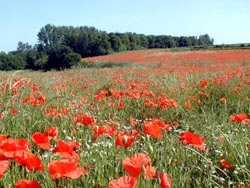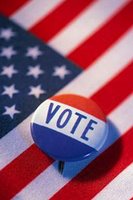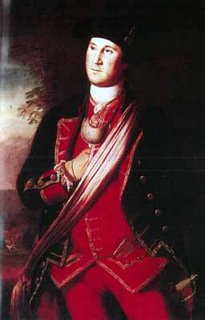William joined the Army Air Force, the precursor to the U.S. Air Force, and received specialized training in Radio Operator and Mechanics School. He would become the radar operator in the big B-24 Bombers that flew over Rommel's tanks in North Africa and over the U-Boats in the Atlantic. R.B. joined the Army as an infantryman, and James joined the Navy as a pharmacist's mate. He would serve in the Pacific Islands, once getting stranded with a wounded sailor for 15 days as they watched their ship leave without them. It would be four years before the brothers saw each other again.
William left his sweetheart, Opal, behind in Kentucky, but their relationship took on a new intensity. Letters flew back and forth across the Atlantic as they professed their affection and attempted to sort out their differences against the backdrop of uncertainty created by world war. Opal began teaching school in Powell County and taking correspondence courses at Kentucky Wesleyan, earning her BA degree in the spring of 1945. After a bout with malaria, William's health began to decline, and eventually he was sent home for stateside duty, which was just fine with Opal. He was able to come home for a short leave during March of 1945, and they were married.
The spring of 1945 was eventful in other ways as well. President Roosevelt died at his home in Warm Springs, Georgia, leaving his successor, Harry Truman, to continue leading the war effort. On April 25, Russian and American troops, who had been making steady progress through German lines from the east and the west, linked up and cut Germany in half. Mussolini was executed and his body hung for display in Milan. Hitler, realizing the war was lost, committed suicide in his underground bunker in Berlin. The war in Europe had come to an end, but the war in the Pacific raged on. Ernie finally graduated from high school and by then, the Army had become much less picky about its new recruits. He was able to join the Army Transportation Corps, stationed aboard the USS Silverado in the Pacific. All of Verlie's boys were at war.
A few long months later, on September 2, 1945, Japan surrendered. The war was over, and the entire world breathed a sigh of relief. The boys who had shipped out four years earlier, full of fire and optimism, were returning as men: tired, victorious and ready to move on with their lives. These soldiers came home, married their sweethearts, had babies, and built their lives around the American Dream. Some of the boys never returned home at all, and many of the ones that did would refuse to discuss their experiences for decades, choosing to honor their fallen comrades with respectful silence.
My grandfather and the millions of men and women like him were heroes, not because of the medals pinned to their uniforms, but because when duty called, they answered. They did what they had to do, and they did it with perseverance, courage and honor. Then they came home, worked hard, raised their families, and lived God-fearing lives of quiet dignity. They represent the best of our national character. They are our veterans.

Ernie, R.B. and James at the WWII Memorial in Washington D.C, Sept 2, 2005. You can read the article here. (Photo by Sgt. Sara Wood)



